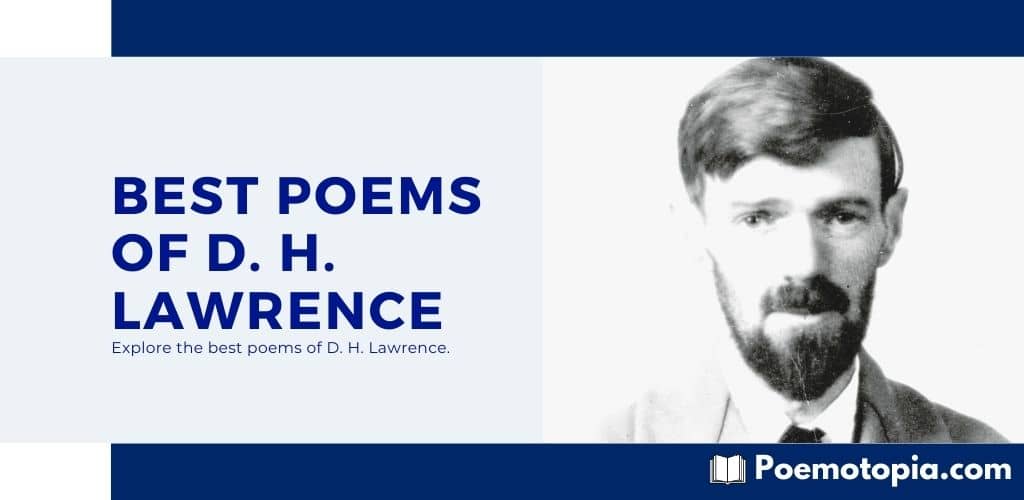10 Best Poems of D. H. Lawrence
David Herbert Lawrence was an English modernist poet and writer. His 44-years-long life may seem short in comparison to the poets who have outlived their generation. But, within this short span of his life, he penned down an incredible number of poems, almost 800! Throughout the second half of his life, his works were either misunderstood or misinterpreted by conventional critics, hiding their eyes from harsh yet truthful modernism. However, critics like E.M. Forster and F. R. Leavis appreciated Lawrence’s artistic excellence and moral seriousness.
Here we are going to talk about the 10 best poems of D.H. Lawrence that riveted his name in the literary history of the 19th century. These poems are liked by poetry lovers of all ages. Without any further discussion on the poet’s ability and agility of versification, it is better to dive into the list.

Snake
Critics consider the poems published in D. H. Lawrence’s memorable poetry collection, Birds, Beasts and Flowers (1923), as his best-known poems. In this collection, the poem “Snake” is the most famous one. It explores the themes of humankind’s distance from nature and hypocrisy.
This poem is about a simple story of the poet and a snake. One day, he went to his water-trough on hot noon. A snake was drinking water from the trough. The poet was so enthralled by its beauty that he felt it was better to stay and watch it. However, the perception consolidated in the form of education made him think it was better to kill the snake for his safety.
Did he kill the snake or let it go? To know the answer, readers have to read the following lines quoted below from “Snake”:
I looked round, I put down my pitcher,
I picked up a clumsy log
And threw it at the water-trough with a clatter.
I think it did not hit him,
But suddenly that part of him that was left behind convulsed
in an undignified haste,
Writhed like lightning, and was gone
Into the black hole, the earth-lipped fissure in the wall-front,
At which, in the intense still noon, I stared with fascination.
And immediately I regretted it.
I thought how paltry, how vulgar, what a mean act!
I despised myself and the voices of my accursed human education.
Read the full poem Snake
Self-Pity
“Self-Pity” is one of the shortest poems that D. H. Lawrence ever wrote. Though this piece contains only four lines, it explores some of the deepest themes in poetry, including spirituality, pity, self-conflict, and death. This piece is placed second on our list for not only its simplicity but for its artistic range.
In this poem, the poet explores the concept of self-pity from the perspective of a wild bird frozen to death. This bird can be a metaphor for the poet’s mind or soul. The condition he was going through in the last stages of his life would not even allow him to notice whether the essence of his life had evaporated or not. Read the full poem below:
I never saw a wild thing
sorry for itself.
A small bird will drop frozen dead from a bough
without ever having felt sorry for itself.
The Ship of Death
Lawrence’s unpublished verse was posthumously published in Last Poems and More Pansies in 1932. These collections include two of his most famous poems. One is the “The Ship of Death,” and another is “Bavarian Gentians”. The latter is discussed in the next point.
“The Ship of Death” is 107 lines long. It is about the model ship that is placed with a corpse at the time of burial. This poem explores the themes of death and the afterlife. Let’s read a few lines from the text:
Now it is autumn and the falling fruit
and the long journey towards oblivion.
The apples falling like great drops of dew
to bruise themselves an exit from themselves.
And it is time to go, to bid farewell
to one’s own self, and find an exit
from the fallen self.
(…)
The flood subsides, and the body, like a worn sea-shell
emerges strange and lovely.
And the little ship wings home, faltering and lapsing
on the pink flood,
and the frail soul steps out, into the house again
filling the heart with peace.
Swings the heart renewed with peace
even of oblivion.
Oh build your ship of death, oh build it!
for you will need it.
For the voyage of oblivion awaits you.
Read the full poem The Ship of Death
Bavarian Gentians
As stated above, “Bavarian Gentians” is one of the most popular poems of D. H. Lawrence. The Gentiana bavarica is a flowering plant that produces bright-blue, broad-lobed flowers. They bloom in July and August. That’s why the poet opens the poem with the following lines:
Not every man has gentians in his house
in Soft September, at slow, Sad Michaelmas.
The poet describes the flower’s dark, yet captivating beauty in the second stanza:
Bavarian gentians, big and dark, only dark
darkening the daytime torchlike with the smoking blueness of Pluto’s gloom,
ribbed and torchlike, with their blaze of darkness spread blue
down flattening into points, flattened under the sweep of white day
Read the full poem Bavarian Gentians
In the last stanza, Lawrence wishes that the flowers would guide him on his way to the underworld. He also uses the allusion to the mythical characters of Persephone and Pluto in order to bring home his point.
Beautiful Old Age
“Beautiful Old Age” is one of the best-known poems on this list. In this poem, Lawrence talks about the beauty of life when it’s ripe with experience. According to the poet:
It ought to be lovely to be old
to be full of the peace that comes of experience
and wrinkled ripe fulfilment.
The poet shares how he wishes to see himself as well as others when they grow old. They should be a source of peace and inspiration to their younger generation. Lawrence writes:
And a girl should say:
It must be wonderful to live and grow old.
Look at my mother, how rich and still she is! –
And a young man should think: By Jove
my father has faced all weathers, but it’s been a life!
Read the full poem Beautiful Old Age
A Love Song
It is one of the well-known love poems of D. H. Lawrence. In this piece, Lawrence’s speaker expresses his true feelings to his beloved. Through the lines, Lawrence tries to draw a picture of fulfillment that a lover finds in his partner. Let’s read a few lines from the poem:
Reject me not if I should say to you
I do forget the sounding of your voice,
I do forget your eyes that searching through
The mists perceive our marriage, and rejoice.
(…)
And I do toss through the troubled night for you,
Dreaming your yielded mouth is given to mine,
Feeling your strong breast carry me on into
The peace where sleep is stronger even than wine.
Read the full poem A Love Song
Lies About Love
This thoughtful poem is about the definition of love. Lawrence delves deeper into the meaning of this word by differentiating truth from lies. According to him:
the truth of yesterday becomes a lie tomorrow,
whereas letters are fixed,
and we live by the letter of truth.
So, what love is for others, is not always the true definition of the word. Lawrence beautifully describes its meaning in the last few lines of “Lies About Love”.
Yet we reiterate love! love! love!
as if it were a coin with a fixed value
instead of a flower that dies, and opens a different bud.
Read the full poem Lies About Love
Tortoises
The poems from Lawrence’s poetry collection, Tortoises, are considered his best-known poems. It was published in 1921. The book includes “Baby Tortoise”, “Tortoise-Shell”, “Tortoise Family Connections”, “Lui et Elle”, “Tortoise Gallantry”, and “Tortoise Shout”. Let’s have a look at a few lines from the opening poem:
You know what it is to be born alone,
Baby tortoise!
The first day to heave your feet little by little from
the shell,
Not yet awake,
And remain lapsed on earth,
Not quite alive.
A tiny, fragile, half-animate bean.
To open your tiny beak-mouth, that looks as if it would
never open
Like some iron door;
To lift the upper hawk-beak from the lower base
And reach your skinny neck
And take your first bite at some dim bit of herbage,
Alone, small insect,
Tiny bright-eye,
Slow one.
Read the poems from Tortoises
A Sane Revolution
“A Sane Revolution” is a satirical poem like Lawrence’s other poem, “Money Madness,” about the way society sees a revolution for any just cause. Lawrence ironically tells readers to revolutionize society for fun. There are several causes that we should speak up for. But, only a few could do so. Here are a few lines from the poem:
Don’t do it, anyhow, for international Labour.
Labour is the one thing a man has had too much of.
Let’s abolish labour, let’s have done with labouring!
Work can be fun, and men can enjoy it; then it’s not labour.
Let’s have it so! Let’s make a revolution for fun!
Read the full poem A Sane Revolution
A Winter’s Tale
This poem revolves around the themes of detachment and death. When a reader first reads this poem, it occurs to be a misty, snow-covered poem about winter. But, it speaks of the death of the speaker’s beloved. She came into his life even knowing the fact that she was near to the inevitable farewell.
Why does she come so promptly, when she must know
That she’s only the nearer to the inevitable farewell;
The hill is steep, on the snow my steps are slow –
Why does she come, when she knows what I have to tell?
Read the full poem A Winter’s Tale
External Resources
- Check out The Complete Poems of D. H. Lawrence — This collection helps poetry lovers to trace Lawrence’s development as a poet and appreciate his remarkable originality and distinctiveness.
- About David Herbert Lawrence — Learn about the poet’s brief biography.
- Poet Profile & Poems of D. H. Lawrence — Explore the poet’s profile and read some of his well-known poems.
- Poems of D. H. Lawrence — Read more poems by Lawrence.






